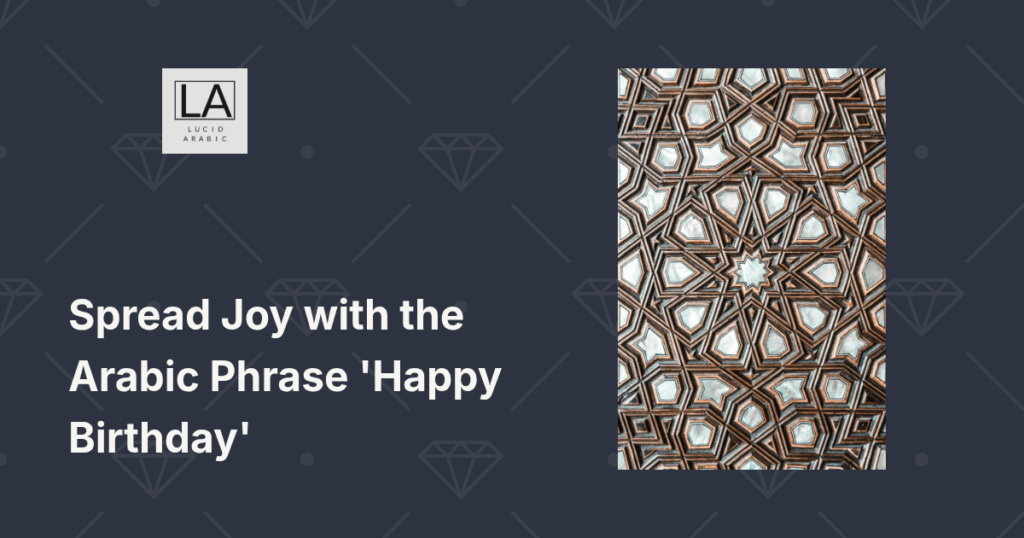Celebrate with Love and Joy: Learn How to Say “Happy Birthday” in Arabic 🎂
Birthdays are universal celebrations of life, love, and happiness. They remind us to cherish another year of memories and growth. In Arabic, wishing someone a happy birthday carries deep warmth and sincerity — it’s not just a phrase, but a heartfelt blessing.
In this post, we’ll explore how to say “Happy Birthday” in Arabic, understand its pronunciation, learn how it varies across different Arab countries, and even discover some fun cultural insights.
The Arabic Phrase for “Happy Birthday”
The most common way to say “Happy Birthday” in Arabic is:
🎉 عِيد مِيلَاد سَعِيد (ʿĪd Mīlād Saʿīd)
Pronunciation: Eid mee-lad sa-eed
Let’s break it down:
- عِيد (ʿĪd) – means festival or celebration
- مِيلَاد (Mīlād) – means birth
- سَعِيد (Saʿīd) – means happy
So literally, it means “Happy Birth Festival.”
It’s elegant, expressive, and full of good wishes.
Pronunciation Guide
Arabic pronunciation can feel tricky at first, but let’s simplify it:
- ʿĪd (عِيد) – “ʿ” is a soft throat sound, like a deep “aah”
- Mīlād (مِيلَاد) – say “mee-lahd”
- Saʿīd (سَعِيد) – say “sa-eed” (like “said,” but stretch the vowels)
🗣️ Together: ʿĪd Mīlād Saʿīd!
Say it with a smile and energy — tone matters as much as words in Arabic!
Variations Across Arabic-Speaking Countries
Arabic dialects are wonderfully diverse, and each region adds its own flavor to the birthday greeting.
🇪🇬 Egyptian Arabic
Egyptians often say:
- كُل سَنَة وَإِنْتَ طَيِّب (kull sana wa enta ṭayyib) – to a man
- كُل سَنَة وَإِنْتِي طَيِّبَة (kull sana wa enti ṭayyiba) – to a woman
Meaning: “May you be well every year.”
It’s used not only for birthdays but also for holidays and anniversaries.
🗣 Example:
- كُل سَنَة وَإِنْتَ طَيِّب، يَا صَاحْبِي!
Kull sana wa enta ṭayyib, ya ṣaḥbi!
→ Happy birthday, my friend!
🇱🇧 Levantine Arabic (Lebanon, Syria, Jordan, Palestine)
In the Levant, people often say:
- كُل عَام وَإِنْتَ بِخَيْر (kull ʿaam wa enta bikhayr)
Meaning: “May you be well every year.”
🗣 Example:
- كُل عَام وَإِنْتَ بِخَيْر، عِيد مِيلَاد سَعِيد!
Kull ʿaam wa enta bikhayr, ʿīd mīlād saʿīd!
→ Wishing you wellness and a happy birthday!
🇲🇦 Maghrebi Arabic (Morocco, Tunisia, Algeria)
In North Africa, you might hear:
- عِيد مِيلَاد مَبْرُوك (ʿīd mīlād mabrook) – Blessed birthday!
- كُلّ عَام وَإِنْتَ طَيِّب (kull ʿaam wa enta ṭayyib) – similar to Egyptian usage.
🗣 Example:
- عِيد مِيلَاد مَبْرُوك، صَاحْبِي!
ʿĪd mīlād mabrook, ṣaḥbi!
→ Blessed birthday, my friend!
Cultural Context: Celebrating Birthdays in the Arab World 🎈
While birthdays are now widely celebrated, it wasn’t always part of Arab tradition. Historically, many Arab and Muslim families didn’t mark birthdays in the Western sense. Instead, emphasis was on milestones — weddings, religious festivals, and family achievements.
However, today, birthdays are joyfully embraced across the Arab world. People host parties, give gifts, sing the Arabic birthday song — سَنَة حِلْوَة يَا جَمِيل (sana ḥilwa ya jameel) — meaning “A sweet year, oh beautiful one!”
In Muslim-majority cultures, the phrase مَبْرُوك (mabrook) — “Congratulations” — is often added to birthday greetings as well, reinforcing the blessing of another year of life.
A Fun Fact About “ʿĪd”
The word ʿĪd (عِيد) appears in important Islamic celebrations such as:
- عِيد الفِطْر (ʿĪd al-Fiṭr) – Festival after Ramadan
- عِيد الأَضْحَى (ʿĪd al-Aḍḥā) – Festival of Sacrifice
Both words reflect joy, renewal, and community — just like birthdays!
So when you say عِيد مِيلَاد سَعِيد, you’re not only wishing someone happiness but also sharing in their personal festival. 🎉
The Origin of Muslim Aid and the Spirit of Blessing 🌙
The Arabic root ع ي د (ʿ-y-d), from which ʿĪd comes, carries the meaning “to return” or “to recur.” Each ʿĪd marks a recurring moment of joy.
Similarly, Muslim Aid was founded with the spirit of recurring good — bringing relief, hope, and blessings (barakah) to communities in need. Just as birthdays celebrate life and gratitude, Muslim Aid celebrates the ongoing renewal of compassion and care.
This connection reminds us that every celebration — even a birthday — can be an opportunity to spread kindness.
Practice Tips: Use the Phrase with Confidence 🎉
- Send a Birthday Text:
- عِيد مِيلَاد سَعِيد! 🎂
ʿĪd mīlād saʿīd! – Happy birthday!
- Add a Warm Blessing:
- أَتَمَنَّى لَكَ سَنَة مُمْتَازَة!
ʾAtamannā laka sanah mumtāzah! – I wish you an excellent year!
- Combine Both Expressions:
- كُل سَنَة وَإِنْتَ طَيِّب، وَعِيد مِيلَاد سَعِيد!
Kull sana wa enta ṭayyib, wa ʿīd mīlād saʿīd! – Many happy returns!
- Respond Gratefully:
- شُكْرًا! الله يِبَارِك فِيك!
Shukran! Allāh yibārik fīk! – Thank you! May God bless you!
Practicing with friends, writing greetings on social media, or even singing the Arabic birthday song will help you remember these expressions naturally.
Why This Phrase Feels Special
Arabic birthday wishes carry emotion, rhythm, and blessing. Each word adds sincerity. When you say عِيد مِيلَاد سَعِيد, you’re not just marking time — you’re acknowledging someone’s presence as a gift.
The blend of language, culture, and feeling makes this phrase deeply meaningful, especially when spoken with warmth.
Conclusion: A Phrase That Celebrates Life 🎂
Learning how to say “Happy Birthday” in Arabic is more than memorizing words — it’s learning to share joy in a language known for its beauty and heart.
So next time a friend’s birthday arrives, surprise them with a smile and say:
عِيد مِيلَاد سَعِيد! (ʿĪd Mīlād Saʿīd!) 🎉
You’ll not only make their day brighter but also connect across cultures — one word of happiness at a time.
Explore other free lessons
How to say “delicious” in Arabic
How to wish joyful “Aid Fitr” in Arabic

